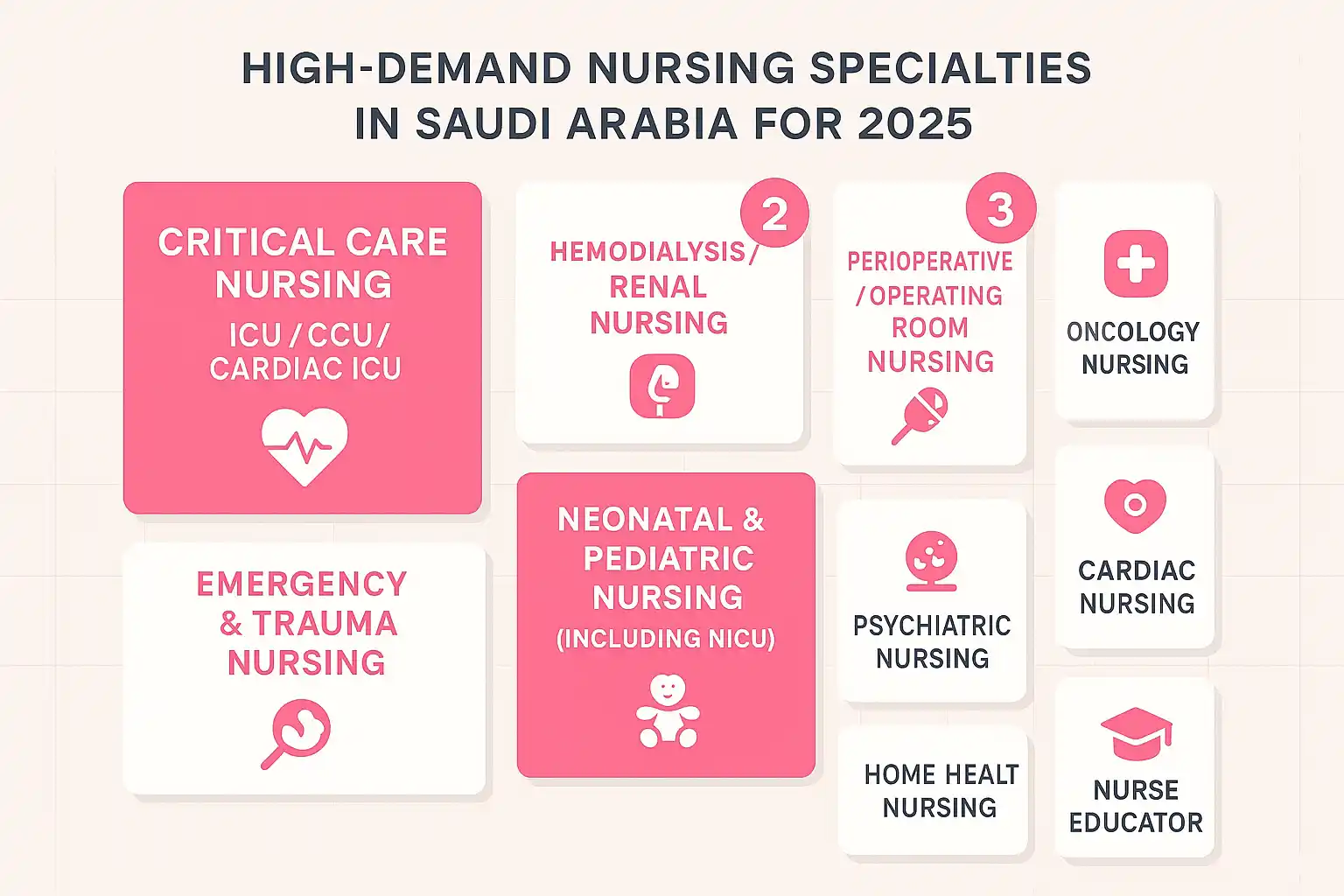Top 10 High-Demand Nursing Specialties in Saudi Arabia for 2026

Why Demand for Nurses Is Growing
Saudi Arabia’s Health Sector Transformation Program (HSTP) has accelerated investment in hospitals, specialized medical centers, and primary care networks. Several factors explain the surge in demand for specialized nurses:
- Expanding population and aging demographics: Increased cases of diabetes, cardiac diseases, and chronic kidney disease create long-term care needs.
- Massive healthcare infrastructure growth: Dozens of new medical cities, cancer centers, and dialysis units are being built or upgraded.
- Saudization initiatives: The Saudi Commission for Health Specialties (SCFHS) and the Ministry of Health are expanding national training pipelines, but demand continues to exceed supply.
- Private sector expansion: Large employers such as Saudi Aramco, King Faisal Specialist Hospital, and private healthcare groups continue hiring experienced foreign and local nurses to staff specialized units.
Top High-Demand Nursing Specialties in Saudi Arabia — 2026
1. Critical Care Nursing (ICU / CCU / Cardiac ICU)
Why in demand: Expansion of critical-care units in tertiary hospitals and cardiac centers.
Employers: Ministry of Health hospitals, King Faisal Specialist Hospital, and private tertiary networks.
Requirements: BSN, SCFHS license, ACLS / CCRN certification, 2–5 years of ICU experience.
2. Hemodialysis / Renal Nursing
Why in demand: Rising chronic kidney disease prevalence and new dialysis facilities.
Employers: MOH dialysis centers, private renal clinics.
Requirements: Dialysis certification, infection control training, vascular access skills.
3. Perioperative / Operating Room Nursing
Why in demand: Higher surgical volumes in private hospitals and specialty centers.
Employers: Surgical hospitals, military facilities, specialty clinics.
Requirements: CNOR certification, sterile technique proficiency, perioperative experience.
4. Emergency & Trauma Nursing
Why in demand: Growth of trauma centers and emergency departments across the Kingdom.
Employers: Major medical cities and emergency units.
Requirements: ACLS / TNCC certifications, strong triage and critical response skills.
5. Neonatal & Pediatric Nursing (Including NICU)
Why in demand: Investments in maternal-child health and neonatal intensive care.
Employers: Maternity hospitals, children’s hospitals, NICU units.
Requirements: Neonatal resuscitation training, NICU experience, SCFHS classification.
6. Oncology Nursing (Chemotherapy / Infusion)
Why in demand: New cancer centers and infusion clinics opening nationwide.
Employers: Cancer hospitals, private oncology clinics.
Requirements: Chemotherapy administration training, oncology nursing certification.
7. Infection Prevention & Control Nursing
Why in demand: Post-pandemic focus on hospital accreditation and safety standards.
Employers: All major hospitals and health systems.
Requirements: CIC (Certification in Infection Control) or equivalent, epidemiology knowledge.
8. Home Health & Community Nursing
Why in demand: Government programs for chronic-disease management and elder care.
Employers: Home-care providers, primary-care networks.
Requirements: Experience in community nursing, patient education, case management.
9. Occupational Health Nursing
Why in demand: Industrial growth and workforce safety initiatives.
Employers: Saudi Aramco, petrochemical companies, corporate clinics.
Requirements: Occupational health certification, first aid and emergency response training.
10. Nurse Educators & Clinical Instructors
Why in demand: National push to develop local nursing workforce and education programs.
Employers: Universities, training institutes, hospital education departments.
Requirements: Master’s degree in nursing or education, teaching experience, SCFHS licensure.
Read also: Top 10 Highest-Paying Nursing Jobs in Saudi Arabia (2026 Updated)
Common Credentials Employers Require
- Valid SCFHS professional license.
- At least two years of specialty experience.
- BLS and ACLS certifications (minimum).
- Advanced certifications (CCRN, CNOR, CIC, or Dialysis Certification) depending on the role.
Geographic Hotspots for Nursing Jobs
- Riyadh: King Faisal Specialist Hospital & Research Centre, King Abdulaziz Medical City.
- Jeddah: King Abdulaziz University Hospital, private multispecialty hospitals.
- Eastern Province (Dhahran / Dammam): Saudi Aramco Medical Services Organization (SAMSO) and industrial hospitals.
- Emerging regions: Qassim, Tabuk, and Al-Ahsa are expanding their regional medical centers under Vision 2030.
How to Prepare for a High-Demand Specialty
- Select a specialty track that matches your experience and market needs.
- Obtain the right certifications — these often determine salary brackets and promotion speed.
- Complete SCFHS classification and DataFlow verification early to avoid delays.
- Keep clinical skills documented through competency logs and audits.
- Apply through verified healthcare employers or recruitment partners such as hospital career portals or nurse specialist agencies like NurseHub GCC.
Additional Specialties Seeing Rapid Growth
- Mental Health / Psychiatric Nursing
- Diabetes & Endocrine Education
- Rehabilitation & Physiotherapy Support Nursing
- Tele-health and Remote Patient Monitoring Nursing
- Infection Control Audit Nurses
Common Credentials Employers Require
- Valid SCFHS professional license.
- At least two years of specialty experience.
- BLS and ACLS certifications (minimum).
- Advanced certifications (CCRN, CNOR, CIC, or Dialysis Certification) depending on the role.
Geographic Hotspots for Nursing Jobs
- Riyadh: King Faisal Specialist Hospital & Research Centre, King Abdulaziz Medical City.
- Jeddah: King Abdulaziz University Hospital, private multispecialty hospitals.
- Eastern Province (Dhahran / Dammam): Saudi Aramco Medical Services Organization (SAMSO) and industrial hospitals.
- Emerging regions: Qassim, Tabuk, and Al-Ahsa are expanding their regional medical centers under Vision 2030.
How to Prepare for a High-Demand Specialty
- Select a specialty track that matches your experience and market needs.
- Obtain the right certifications — these often determine salary brackets and promotion speed.
- Complete SCFHS classification and DataFlow verification early to avoid delays.
- Keep clinical skills documented through competency logs and audits.
- Apply through verified healthcare employers or recruitment partners such as hospital career portals or nurse specialist agencies like NurseHub GCC.
Conclusion
Saudi Arabia’s health sector transformation continues to generate unprecedented demand for qualified specialty nurses. Critical care, dialysis, perioperative, oncology, infection control, and pediatric nursing are among the most sought-after fields in 2026. Nurses who hold SCFHS licenses, obtain recognized certifications, and align their skills with national health priorities are positioned to find strong career growth and competitive compensation across the Kingdom.



